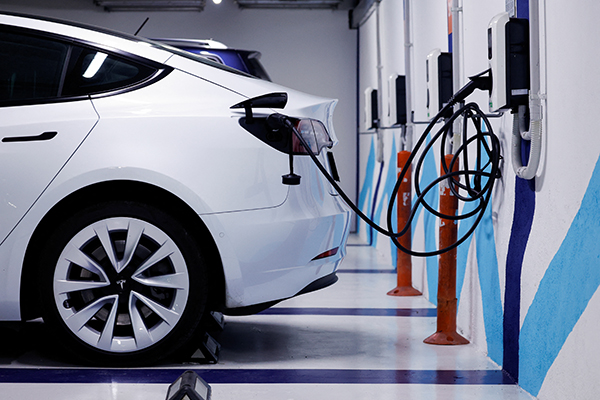Introduction
The global automotive industry is transforming with the rise of electric vehicles (EVs). As the world grapples with environmental challenges and seeks sustainable transportation alternatives, the electric vehicle market has emerged as a frontrunner in revolutionizing our commute.
This article explores the dynamic landscape of the global electric vehicle market, delving into key trends, market drivers, challenges, and the future outlook.
Rapid Growth and Market Trends
The electric vehicle market has experienced exponential growth in recent years. Factors such as advancements in battery technology, government incentives, and increasing environmental consciousness among consumers have propelled this growth. Leading automakers like Tesla, Nissan, and BMW are investing heavily in EV research and development, driving innovation and expanding the market.
A number of trends are emerging in the global EV market, including:
- The rise of Chinese EV makers: Chinese EV makers are becoming increasingly competitive, and are beginning to challenge established players in global markets.
- The growing popularity of affordable EVs: A number of affordable EV models are now available on the market, making EVs more accessible to consumers.
- The increasing availability of charging infrastructure: The availability of charging infrastructure is essential for the adoption of EVs. Governments and businesses are investing heavily in expanding charging networks.
Market Drivers
- Environmental Concerns: With climate change becoming a pressing issue, consumers actively seek eco-friendly alternatives. EVs, producing zero tailpipe emissions, are at the forefront of sustainable transportation solutions.
- Government Initiatives: Governments worldwide are introducing incentives, tax benefits, and subsidies to promote EV adoption. These initiatives encourage manufacturers and consumers to participate in the green mobility revolution.
- Advancements in Battery Technology: The development of high-performance, cost-effective batteries has significantly enhanced EVs’ driving range and charging efficiency. This has mitigated “range anxiety,” a common concern among potential buyers.
Challenges and Solutions
- Charging Infrastructure: The expansion of charging stations remains a challenge. However, collaborative efforts between governments and private enterprises are rapidly increasing the number of charging points globally.
- Battery Recycling: As the number of EVs grows, so does the concern about battery disposal. Research into sustainable battery recycling methods is ongoing, aiming to minimize environmental impact.
- Affordability: EV prices have decreased but still tend to be higher than traditional vehicles. Continued research and economies of scale are expected to reduce production costs, making EVs more affordable for the average consumer.
Market Share by Region
Europe is one of the prominent regions in the global EV market. The steps taken by the governments of European countries to reduce carbon emissions have been driving the growth of the market in the region. According to the IEA, in Europe new electric car registrations more than doubled to 1.4 million representing a sales share of 10% in 2020.
Germany registered 395,000 new electric cars and France registered 185,000. In the UK, registrations more than doubled to reach 176,000. Electric cars in Norway reached a record high sales share of 75%, up about one-third from 2019. Sales shares of electric cars exceeded 50% in Iceland, 30% in Sweden, and reached 25% in the Netherlands.
Moreover, the market growth of EVs in Asia-Pacific is led by China, Japan, and South Korea. China is among the leading market for EVs across the region. The governments of Asian economies such as China, India, South Korea, and Japan are supporting the Electric vehicles’ market growth by installing charging stations, framing emission norms, and shifting to full or hybrid from internal combustion engine (ICE) vehicles. Further, the new vehicle scrap policy in India will pave the way for the development of the country’s automotive industry.
Future Outlook
As per RationalStat analysis, the global electric vehicle market is estimated to witness a robust growth rate of 23.5% during the period 2023-2030. Rising concern about air pollution in urban areas is one of the key drivers of the growth of the EV market. Conventional fuel vehicles are one of the leading causes of air pollution; it forces government bodies to impose strict rules and regulations on car manufacturers to restrain vehicle emissions.
The growth of the EV market will have a number of positive impacts, including:
- Reduced air pollution: EVs do not produce tailpipe emissions, which can help to improve air quality.
- Reduced greenhouse gas emissions: EVs can help to reduce greenhouse gas emissions from the transportation sector.
- Increased energy security: EVs can help to reduce reliance on imported oil.
Conclusion
The global electric vehicle market is not just a trend; it’s a fundamental shift toward a greener, more sustainable future. With ongoing technological advancements, supportive government policies, and a growing awareness of environmental issues, the electric vehicle market is set to revolutionize the automotive industry.
As consumers increasingly recognize the benefits of EVs, from reduced emissions to long-term cost savings, the electric vehicle market will continue to expand, shaping how we commute and contributing significantly to a cleaner planet.















